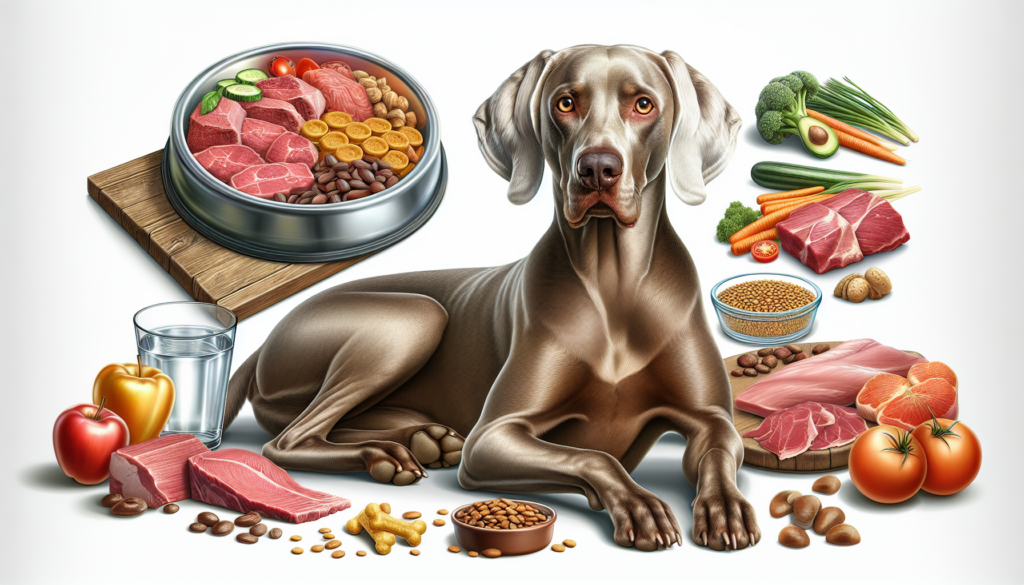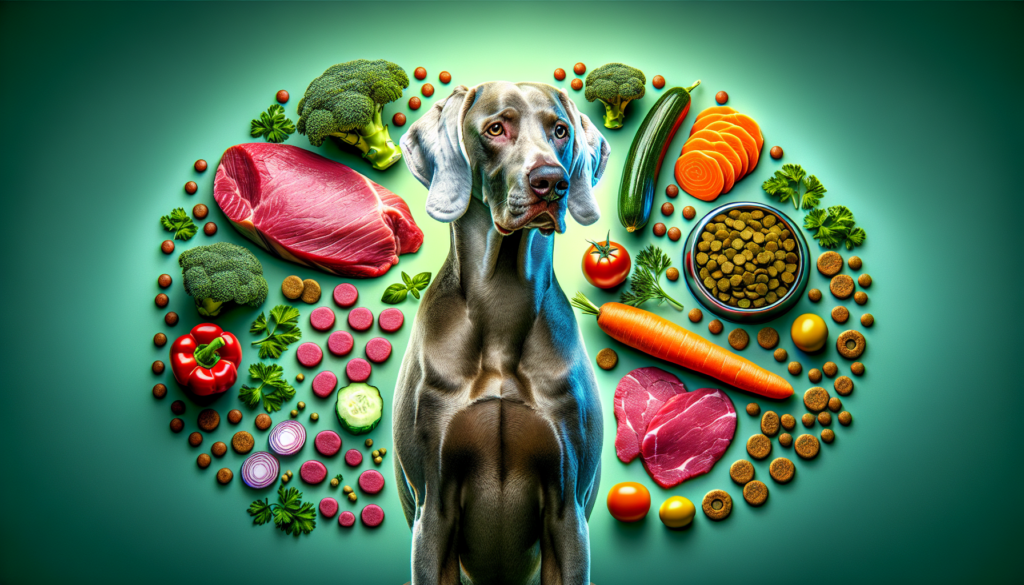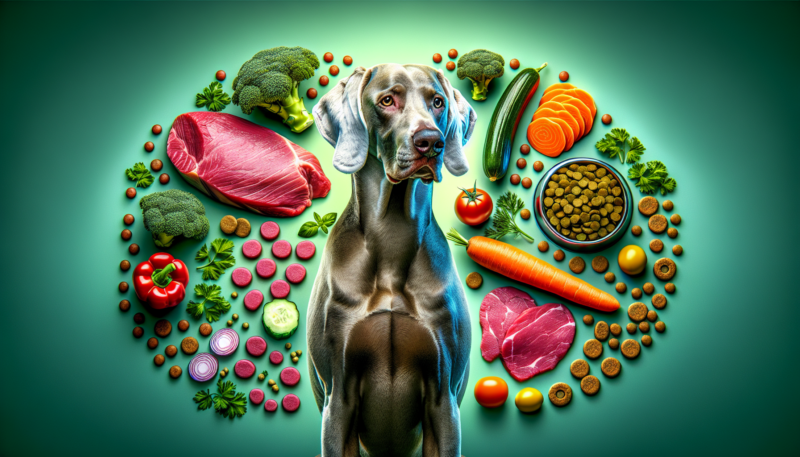Have you ever wondered what the ideal diet is for Weimaraners? If you are a proud owner of this elegant and energetic breed, you undoubtedly want to provide them with the best nutrition possible. Understanding what to feed your Weimaraner is crucial to their health and well-being. From the type of food to portion sizes, finding the perfect balance can be a challenge. In this article, we will explore the ideal diet for Weimaraners, giving you all the information you need to keep your furry companion happy and healthy.
What is the Ideal Diet for Weimaraners
Understanding the Nutritional Needs of Weimaraners
As a devoted Weimaraner owner, it’s important for you to understand the nutritional needs of your furry companion. Weimaraners are active and energetic dogs known for their athleticism and hunting capabilities. To ensure their health and well-being, providing them with a balanced and nutritious diet is crucial.
Weimaraners require a diet that is rich in high-quality protein, fats, and carbohydrates. These nutrients not only provide energy but also support proper growth, development, and maintenance of their muscles, bones, and organs. Additionally, essential vitamins and minerals are necessary to support their overall health and immune system. By understanding their nutritional needs, you can make informed decisions when choosing the right type of food for your Weimaraner.
Choosing the Right Type of Food
When it comes to choosing the right type of food for your Weimaraner, there are several options to consider. The two main options are commercial dog food and homemade diets.
Commercial dog food is formulated to meet the nutritional requirements of dogs and comes in various forms such as dry kibble, wet canned food, and freeze-dried or dehydrated options. These products undergo rigorous testing and are generally complete and balanced, providing your Weimaraner with all the essential nutrients they need. Look for high-quality brands that use real meat as the first ingredient and avoid those with artificial additives or fillers.
Alternatively, some owners prefer to prepare homemade diets for their Weimaraners. This option allows you to have more control over the ingredients, ensuring the use of fresh and natural foods. However, it is important to consult with a veterinary nutritionist or your veterinarian to ensure that the homemade diet meets all of your Weimaraner’s nutritional needs.

Balancing Macronutrients for Optimal Health
To maintain optimal health, it is crucial to provide your Weimaraner with a balanced combination of macronutrients, which include proteins, fats, and carbohydrates. Proteins are essential for building and repairing tissues and should make up a significant portion of your Weimaraner’s diet. High-quality animal proteins, like chicken, turkey, or fish, are ideal choices.
Fats are another important macronutrient for Weimaraners, as they provide a concentrated source of energy. Omega-3 and omega-6 fatty acids, found in fish oil or flaxseed oil, are particularly beneficial for their coat health and immune system. However, it is important to moderate the fat intake to prevent obesity and other related health issues.
Carbohydrates, while not as essential as proteins and fats, can still play a role in your Weimaraner’s diet. They provide a source of energy and fiber. Whole grains, such as brown rice or quinoa, and vegetables are excellent sources of carbohydrates for your Weimaraner.
Meeting the Energy Requirements
As highly active dogs, Weimaraners have higher energy requirements compared to less active breeds. Providing adequate calories is crucial to support their daily activities and maintain a healthy body weight. The exact energy requirements vary depending on factors such as age, weight, activity level, and overall health. Consulting with your veterinarian is essential to determine the appropriate calorie intake for your Weimaraner.
While it is crucial to provide enough calories, it’s equally important to prevent overfeeding. Obesity can lead to various health issues, including joint problems, diabetes, and decreased overall quality of life. Be mindful of portion sizes and avoid excessive treats or table scraps, as these can contribute to weight gain.

Considering the Age and Life Stage
Just like humans, Weimaraners have different nutritional needs at different stages of life. Understanding these needs is vital to support their growth and development.
Puppies require a diet that is higher in calories, protein, and essential nutrients to support their rapid growth. Look for specially formulated puppy food that meets the Association of American Feed Control Officials (AAFCO) standards for growth. These diets are designed to provide the necessary nutrients to support bone development and overall growth.
Adult Weimaraners have slightly different nutritional requirements. They still need a balanced diet that provides adequate protein, fats, and carbohydrates, but in slightly different proportions. It’s important to transition your Weimaraner to an adult formula suitable for their life stage once they reach maturity.
Senior Weimaraners may have specific dietary needs, such as reduced calorie intake and joint support. Consider switching to a senior dog formula or consult with your veterinarian to determine any necessary changes to their diet.
Addressing Specific Health Concerns
Weimaraners may be prone to certain health concerns, and their diet can play a crucial role in managing or preventing these issues. Some common health concerns to be aware of include hip dysplasia, bloat, and food allergies.
For dogs with hip dysplasia or joint issues, a diet enriched with glucosamine and chondroitin, as well as omega-3 fatty acids, can help support joint health and reduce inflammation.
Bloat, a potentially life-threatening condition, can be prevented by feeding your Weimaraner smaller, more frequent meals and avoiding strenuous exercise immediately before and after meals. Consider using slow feeder bowls to reduce the risk of gulping down food too quickly.
If your Weimaraner has known food allergies or sensitivities, you may need to opt for a limited ingredient or hypoallergenic diet. These diets typically feature novel protein sources and avoid common allergens such as beef, chicken, or wheat.
The Role of Protein in a Weimaraner’s Diet
Protein is an essential macronutrient for Weimaraners, as it plays a crucial role in building and repairing tissues, supporting the immune system, and providing energy. High-quality animal proteins should be the primary source of protein in your Weimaraner’s diet.
When selecting dog food, look for products that list a specific animal protein, such as chicken or turkey, as the first ingredient. Be cautious about plant-based proteins, as they may not provide the same complete amino acid profile that animal proteins do.
The protein requirements for Weimaraners vary based on their age, activity level, and overall health. Puppies and highly active dogs generally require a higher percentage of protein in their diet compared to adult and senior dogs. Consult with your veterinarian to determine the appropriate protein levels for your Weimaraner.
Importance of Essential Fatty Acids
Essential fatty acids, such as omega-3 and omega-6, are vital for your Weimaraner’s overall health. These fatty acids cannot be produced by the body and must be obtained through diet.
Omega-3 fatty acids, commonly found in fish oil or flaxseed oil, have numerous benefits for Weimaraners. They support a healthy coat and skin, promote brain development, reduce inflammation, and strengthen the immune system. Incorporating a source of omega-3 fatty acids into your Weimaraner’s diet can help maintain their overall well-being.
Omega-6 fatty acids, on the other hand, are found in various plant-based oils. While they are essential for your Weimaraner, it is important to maintain a balance between omega-3 and omega-6 fatty acids. An imbalance can lead to inflammation and other health issues. Choosing dog food that contains the appropriate ratio of omega-3 to omega-6 fatty acids can help you maintain this balance.
Including High-Quality Carbohydrates
While dogs are primarily carnivores, carbohydrates can still play a role in a Weimaraner’s diet. High-quality carbohydrates provide a source of energy and essential fiber for digestive health.
Whole grains, such as brown rice, quinoa, or oatmeal, are excellent sources of carbohydrates for Weimaraners. They release energy slowly, providing sustained fuel for your active companion. Additionally, these grains contain essential vitamins and minerals that contribute to their overall well-being.
Vegetables, such as carrots, green beans, or sweet potatoes, can also be included in your Weimaraner’s diet. These vegetables offer additional fiber, vitamins, and minerals without adding excessive calories.
The Significance of Vitamins and Minerals
Vitamins and minerals play a vital role in your Weimaraner’s health, supporting various bodily functions and promoting overall well-being. While a balanced and complete diet should provide most of the essential vitamins and minerals, additional supplementation may be necessary in some cases.
Consult with your veterinarian to determine if your Weimaraner requires any specific vitamin or mineral supplementation. Excessive amounts of certain vitamins or minerals can be harmful, so it’s important to follow your veterinarian’s guidance to ensure your Weimaraner’s diet is properly balanced.
In conclusion, providing your Weimaraner with the ideal diet is essential for their overall health and well-being. Understanding their nutritional needs, choosing the right type of food, and balancing macronutrients are key factors in promoting optimal health. Additionally, considering their age, addressing specific health concerns, and incorporating essential fatty acids, high-quality carbohydrates, vitamins, and minerals into their diet will ensure your Weimaraner thrives. Remember, always consult with your veterinarian to tailor their diet to their specific needs and enjoy a happy and healthy life with your beloved Weimaraner.
